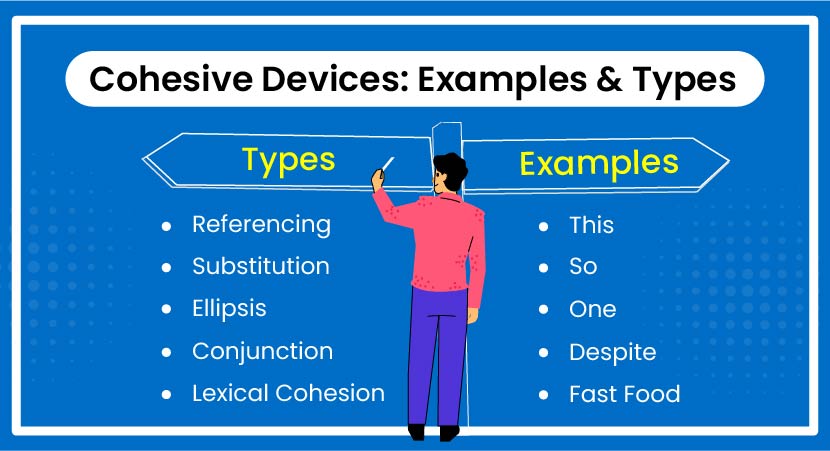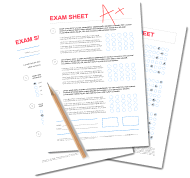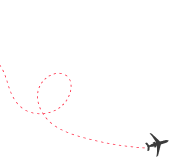Cohesive devices commonly known as linking words, play a vital role in the IELTS writing section. These words help you connect and link different thoughts together, improving the flow and coherence of the writing. Moreover, this blog covers the meaning and cohesive devices examples. Furthermore, examples of how to use them in a sentence, and tips to use these devices effectively in your essay writing are also provided. So let’s begin!

Table of Contents
Cohesive devices in IELTS also known as connecting words are used to link and join different sentences. It enhances the flow of the content and adds logic to the text. Moreover, these words act as connectors between ideas. These include, words and phrases like ‘however’, ‘therefore’, ‘moreover, ‘for instance, ‘in conclusion’ etc. link words used in writing. Using them appropriately makes your writing more coherent and easier to follow. Besides, coherence and cohesion are important criteria in the scoring of the exam.
Now that you are clear about what are cohesive devices, let us further look at the types of cohesive devices and some examples.
Different types of cohesive devices can be used in IELTS academic task as they enable you to write with clarity and coherence. Moreover, these words help the reader to focus on the topic and understand it better. You may use them in IELTS writing. This section covers the types of cohesive devices with examples
1. Referencing
Reference words are cohesive devices used to denote the already-mentioned ideas or phrases. When you refer to something that has been stated in the text previously is called referencing. It enables you to use pronouns and expressions like ‘such’, ‘this’, ‘those’, ‘it’, and more. Here are some illustrations for your reference:
2. Substitution
Substitution is a way of reducing repetition in the writing. Moreover, these cohesive devices are used when one word is replaced with another typically to avoid the occurrence of the noun is known as substitution. Words like ‘do’, ‘so’, and ‘one’ can be used to swap with the text that you intend to change. Let us look at some examples for a better understanding:
3. Ellipsis
Ellipsis comes under the types of cohesive devices category. Ellipsis typically means removing a word or a phrase from a sentence because the interpretation of the previous line is implied. This omission reduces the repetition of words in the text and makes it easy to interpret. Here are a few illustrations:
4. Conjunctions
Conjunctions are a standard way of connecting words, phrases, ideas, and sentences. Moreover, cohesive devices allow you to form complex sentences, and thus can also be termed as connectors. These include, ‘like’, ‘and’, ‘or’, ‘but’, ‘then’, ‘because’, and more. Besides, here are some examples:
5. Lexical Cohesion
These cohesive words may be used in both IELTS general tasks and academic tasks. Lexical cohesion deals with the connections based on the word used and not on the grammatical or semantic connections in the text. Moreover, it refers to repeating related nouns in a text. Further, you may even use synonyms, antonyms, and collocations to connect the ideas.
A. Synonyms
Synonyms are different words or phrases that express and intend the same meaning. These are alternative words that convey an identical thought and improve cohesion in the text.
B. Antonym
An antonym is a word or phrase that means the opposite of another word. It can also be stated as contrasting words and ideas using opposites.
C. Reiteration
Reiteration typically means repeating the keywords in the text. This is usually done to improve the clarity of the content. Moreover, it also helps you to emphasize a specific idea and enhances the coherence of the text.
D. Collocation
Collocation is combining words or terms that usually go together. When two different ideas are placed together, side by side in contrast is called collocation. These cohesive devices give a well-written effect to the reader.
These were a few kinds types of cohesive devices. Now let us move on to the next section that discusses the uses of these words in IELTS exam.
The use of cohesive devices in IELTS plays a crucial role in determining your band score for IELTS. Listed below are a few uses of cohesive devices:
These are the uses of cohesive words. Further, there is a list of cohesive devices in IELTS that students can use.
Do you know the importance of coherence and cohesion in IELTS? The next section covers their role in IELTS writing tasks.
Before understanding why coherence and cohesion matter, let us first understand what is coherence and cohesion in IELTS.
Coherence meaning in IELTS refers to the flow of ideas in the writing. The thoughts must be appropriately sequenced and organized. On the other hand, cohesion in IELTS refers to the words and phrases connecting sentences in your writing to logically make sense.
Now, coming to the part why these matter in IELTS writing. This is because it contributes 25% to the IELTS scoring criteria. To achieve a desired score in the IELTS essay writing one should use a range of cohesive devices. As a low-scoring essay has little or no cohesion in the text. Thus, both coherence and cohesion act as linking words for IELTS and can significantly impact your writing scores.
Further, let us look at a sample essay with cohesive devices. This will help you understand the usage better.
Here’s a sample of writing Task 2, using different types of cohesive devices from one of the IELTS mock tests. Read it along with the underlined words.
With reference to recent news, there have been a lot of discussions about health and whether it is going to improve or not. In my view, I think that people will become unhealthier in the future than they are now.
Here are the reasons that support the idea of people becoming unhealthy in the future. First, one reason is food and eating habits. People tend to eat more fast food nowadays. This appears to be because people are busier now than they used to be and they can not cook at home. As a result, having a lot of unhealthy food can lead to obesity and could become a serious issue in the future. Another reason is that technology is developing every day. Young people enjoy buying the latest devices and this hurts their health, especially their mental and physical well-being. Spending long hours in front of the screen can lead to poor eyesight and depression. Both of these reasons result in lazy people.
Other people might disagree and say that health will improve in the future. With the ever-growing technological advances come new ways to stay physically active. Some apps track how many daily steps a person takes. There are also video games that promote physical activity such as sports games. Some also believe that different types of sports and other forms of exercise will appear in the future.
In conclusion, although technology is trying to keep people active in different ways, I believe that health is affected negatively by fast food and technology, and it will be a problem in the future.
This essay uses ample coherence and cohesion in the paragraph. In fact, a list of cohesive devices like referencing (this, they), conjunctions (but, moreover), discourse markers (In conclusion), synonyms (physical activity), and collocations (fast food) are used to organize the ideas logically and make the writing more coherent.
Let us look at another sample of IELTS essay writing, highlighting cohesive devices in IELTS.
A lot of people think sports help society, while others argue they are a waste of time and energy. However, according to me, sports offer benefits like health, socializing, and stress relief but they can also lead to injuries and obsession in some cases. Thus, there are ample precautions that people must take in order to live a healthy life.
On the one hand, participating in sports is a physical activity that improves both mental and physical health. Moreover, sports like football, cricket, and hockey are a great way to learn skills like teamwork, leadership qualities and more. These are team sports and build require cooperation with teammates. Another benefit is that sports offer a way to unwind and manage anxiety. As it is said, ‘a healthy body equals a healthy mind.’
However, on the other hand, sports carry risks like career-ending injuries. Participating in sports can have long-term consequences ranging from minor sprains to serious fractures or concussions. Furthermore, becoming consumed by sports can also negatively impact work and studies. Especially in a sensitive age like teenage, students need to make a balance between play and study. Although sports have advantages, in certain situations they can be detrimental as well. Overall, if one divides their time wisely then sports may not be too much of a distraction.
In conclusion, sports are beneficial for society if practiced moderately but harmful if taken to extremes. Therefore, a balanced approach is necessary to utilize their advantages and avoid the downsides of sports. The key is moderation which one should keep in mind.
The sample essay uses various cohesive devices list like referencing (this, they), conjunctions (but, moreover), discourse markers (In conclusion), repetition (sports), synonyms (obsession), antonyms (advantages/detrimental), and collocations (career-ending injuries) are used to organize the ideas logically and make the writing more coherent.
To wrap up, cohesive devices in IELTS are vital components in the writing section as these devices give flow and structure to your writing. These words demonstrate your range of vocabulary and grammar. Effectively using these may have a positive effect on your overall band score. Moreover, it is vital to understand the main types of devices that can be used in IELTS essay writing. This blog covers some examples for your reference.
Besides, if you are someone looking for expert assistance then you must contact Gradding.com. Here you will find professionals who will guide and assist you throughout your preparation. Moreover, you may even join the IELTS preparation classes along with the mock test series.

We are available in :
BangaloreAhmedabadJaipurHyderabadKeralaPuneChandigarhMumbaiGurgaonChennaiKolkataTrivandrumNoidaKochiCalicutKottayamKollamThrissurIndoreUdaipurdisclaimer:logos and other registered trademarks of universities used on this platform are held by their respective owners. Gradding does not claim ownership or association on them, and their use is purely for informational and illustrative purposes.

 Take Writing Mock Test Now!
Take Writing Mock Test Now! 


